BootBoxMar04
The Boot Box
Reviews by Ted “The Boot” Boothroyd
 Various:
Putumayo Presents World Reggae
Various:
Putumayo Presents World Reggae
[Putumayo World Music, 2004]
Pushing past Putumayo Presents,
ponder the part that says World Reggae.” Notice that world comes
before reggae. Thats the key to this adventurous, beautiful album.
As contrast, consider the same labels 1998 compilation Reggae Around
the World (notice reggae in the priority position), which was essentially
a collection of reggae acts from various countries. The difference is
subtle but significant. If you are lucky enough to have heard the Twinkle
Brothers albums from a decade ago that featured a family of musicians
in Poland, you know how perfectly and naturally those Polish folk songs
were wedded to reggae rhythms. Thats what this album does, except the
scope is far wider. As for the resultsartistically successful, hugely
enjoyable.
One of the more familiar names
here is Apache Indian, and his track is an early highlight. It starts
as a slow, prayerful chant that leads to a deep bass and drums foundation
for the vocalist as he explores his identity in a sing-jay style. East
Indian flute in background, East Indian melody line; ululating tonesits
all very intense and exciting. Another standout track comes to us from
Cape Verde, with acoustic guitar, organic percussion, and melancholic
vocal by Maria de Barros, whose friendly and pleasant-with-an-edge voice
will remind you of Cesaria Evora. Skip to north-eastern Brazil for Maguinha
do Sá Viana, a relaxed handling of a traditional melody, with understated
wahwah guitar intro, base-heavy reggae heartbeat and solidly forró vocal.
Not that everything is slow. You
want upbeat? Try the quick, attractive arrangements and intriguing group
harmony vocals of Rawagu from the South Pacific island of New Caledonia.
Tune into Agua and its strong echoes of Manu Chaos accessible, multi-influenced
sound; listen to the lively fiddle sawing away in the background; be charmed
by fiddle/acoustic guitar duet interlude. You want changes? The spare
North African instrumentation and sound that starts Ya Laymi is supplanted
by an upbeat reggae riddim and male voice singing in Arabic; it moves
into a fuller sound, becomes spare again, gets into some vocal arabesques,
speeds up briefly and finally concludes: a complex production.
There is so much more. Memorable
riffs, tuneful melodies, assured vocals, incredible musicianship, intensity
here, serenity there, beauty everywhere. A few of the artists youll recognize,
many others you wont, but all are wonderful at making music. In a word,
Putumayo Presents World Reggae is superb. Go get it.
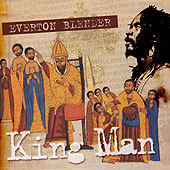 Everton
Blender: King Man
Everton
Blender: King Man
[Heartbeat, 2003]
King Man is very strong,
appealing album, and I hope for your sake that you buy it. But there’s
something you should know: it includes “Little Green Apples.”
Yep, I’m afraid so. Over the course of many hearings I’ve
gone through a bizarre grieving process about that one song. From my original
disbelief, shock and dismay, I moved on to regret, then to despair, then
briefly to reluctant acceptance, with a slight side emotion of sympathy
for the state of mind Blender must have been in when he decided to include
it. I never quite fell into outrage, but I was close. Now when the song
comes on I’m back to disbelief, illogical though that be. My remote
never leaves my side now. It’s an over-reaction, I know.
With that single exception,
the music on the 17-track King Man is superb. There’s lots
of variety, creativity galore, yet it never strays from its bona fide,
rootsy reggae rhythms and themes. It has energy, it has beauty, it has
credibility, it has coherence, it has staying power. Convincing vocals
over dynamic arrangements deliver memorable song after memorable song.
First it’s Sermon on the
Mount time, with Blender reciting a few of The Beatitudes to a lilting
tune, quick tempo and great horn riff. We move into a socio-personal theme
about the singer’s relationship with a praise-worthy woman. The
aforementioned unmentionable comes third, complete with Dr. Seuss and
Indianapolis in the summertime, and I do admit it’s preferable to
the original hit—just as catchy (unfortunately) and less bathetic.
“Tabernacle Tree” quickly rescues the album with more horns,
a tune you can hum, and encouraging lyrics. It’s followed by “Is
It Because I’m Black”, an insistent powerhouse of a song.
Track six asks Babylon to lay down its arms, and in the next, the title
tune, Blender the Dread tries to win approval from his girlfriend’s
father. A vigorous, cooking groove gives shape and power to “False
Tongue” despite a relatively weaker tune. And we’re still
not quite halfway to the end.
Blender’s treatment of
universal love is confusing: “Love is inside you and it’s
nowhere else.” But I like the way he handles jealousy and conflict
in “Who Cares”, presenting a far more respectful and mature
attitude than Ken Boothe displayed years ago with the despicable “Second
Chance”. You see? Reggae does progress. Then comes another social
theme (“cost of living gets so high”) with a strong melody
line. Fast nyahbinghi drumming anchors the furious rhythm of “Do
Good”, while horns are again prominent in the catchy “Backra”,
one of the album’s highlights. The tune, engaging chorus and quick
tempo of “The System” makes it another standout. Finally,
an “extended mix” (including some toasting and dub effects)
and a couple of “binghi mixes” bring the album to a highly
satisfactory close.
There you have it. If King
Man isn’t a terrific disk, then all I’ve got to say is
Jah didn’t make little green apples.
Bill Laswell: ROIR Dub Sessions
[ROIR, 2003]
Im not great at keeping up with
musical classification systems. As you can see, the built-in moniker for
this music is dub, but youll never mistake it for Scientist or King
Tubbys dub. Never, never. No doubt somewhere theres a categorical label
for this music that has several hyphens and eight or nine syllables, one
of which is the quasi-word techno, which I figure applies equally well
to the wax cylinder technology of recording antiquity. But in the absence
of a better term right now, lets accept the album titles claim and call
this dub.
This dub disk has four long pieces,
each taken from one of the four Laswell albums on ROIR. The album titles
are so pretentious theyre scary, but the music as sampled here is just
fine. The first piece starts slowly with electronic chords, interrupted
eventually by reverberating bangs. Then a throbbing bass joins in. Lots
more tones and indescribable sounds slowly ease into, around and out of
the mix, as little by little we realize that a rhythmic pulse has been
gathering momentum. As in a classical work, the musical theme comes and
goes, is explored and altered. Higher, softer and friendlier effects are
introduced, then a few electronic sweeps. Were not really going anywhere,
but who cares? We simply accept that the point is the quiet and contemplative
journey, not the non-existent destination.
Thunupa immediately launches
into vibrant East Indian percussion and various electronic sounds. Then
an abrupt change as a cornet starts playing something that resembles a
melody and the beat takes on a reggae feel. The well-spaced horn phrases
sound like Miles Davis, while in the background is a long, subtle, deep
rolling, as if the whole construct is some sort of living, breathing entity.
Indian percussion begins anew
and takes us close to the end, which comes 13½ minutes after the piece
began. Track three: after various whirrs and wahwahs and fades, Cybotron
settles into a strong rhythm and an interesting electronic figure that
just plays with us awhile before it allows other swoops and echoes and
a deep bass to overtake it. A pure, deep, subdued reggae rhythm arises,
only to disintegrate as yet other sounds take over, and gradually everything
slips into the void. As for the final track, the first part has a heartbeat
throbquiet, contemplative, all the time in the world for GiGi Shibabaws
precise, melodic and soulful singing. Then we move into an electronic,
bass-laden reggae as great rolling, whizzing and whirring sounds compete
for airtime; there are echoes of Augustus Pablo, Lee Perry, King Tubby
and a train coming through.
Like many classical compositions,
this is complex, abstract music, with a single track having several distinct
movements that may or may not reveal a close link. ROIR Dub Sessions
may be less immediately accessible than you are used to, but like
its distant cousins of the good old Jamaican variety, this dub sure
has its pleasures. Dont try to make sense of it; just let the sounds
flow, and enjoy.
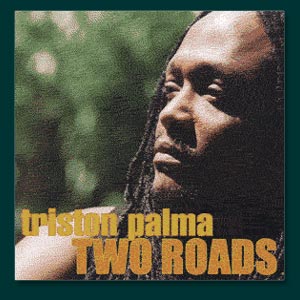 Triston
Palma: Two Roads
Triston
Palma: Two Roads
[Easy Star, 2000]
Apparently way back at the turn
of the century, I was skimming along too quickly with too narrow a focus
to notice Two Roads lying slightly off the particular highway
system I was on. But now I have not only noticed, but taken a very nice
spin along that route, and the scenery is great. I heartily recommend
that you get off your beaten path at some intersection ahead and try Two
Roads as well.
This metaphor Im travelling on
could soon get rather slippery, so Ill abandon it before I slide ungracefully
onto the shoulder. Okay, done. What we have here is an extremely likable
reggae album. It has a modern sound (lots of digital programming and studio
trickery) that nonetheless appeals greatly to the roots fan in me. All
the songs were written by Palma and Steven Ibanez in cahoots with one
of five other individualsits teamwork that actually worked, somehow
generating solid and compelling tunes. The dynamics, the rhythms, the
tempos all offer sufficient variety to keep things interesting and fun
throughout. And the musicians do their jobs with professionalism and spirit.
One of the elements of Two Roads
I like best is what the lyrics say about family. Not the universal
family of mankind, but the small family unit. Remember when Burning Spear
had titles like Children and Mother and chanted about his sister washing
the dishes and his smaller brother picking up firewood? Thats what I
mean. On this albums first track Palma sings, From the day I was born
I see my parents struggling. In the next song its From the day I know
myself, my mom shes always there. Later, These were the words that
have been taught to me by my own grannie. That kind of individual reminiscence
becomes profound observation, and such personal, human touches make this
album stand out.
As for musical highlights, the
title tune is one: a hit single thanks to its jaunty dancehall beat, supple
and melodic vocal, tinkling electronic figure and inventive percussion.
The Struggle was also a hit, due in part to the fast toast by Norris
Man. Hatred in the Youths has an urgent message, delivered tunefully.
The chorus structure in Get Up effectively hooks us in and keeps us
involved, while prominent horns and Mary Ochoas spirited guest vocal
make Ragga Salsa exactly what it says. When I Call on Jah is another
favorite because of its gospel call and response style.
The album is not perfect. Some
of the big production numbers are simply over-arranged; some of the lyrics
tend toward the sappy. A couple of the tunes are forgettable. But all
in all, Two Roads is well worth paying the toll to ride on, because
youll quickly find yourself enjoying the trip.
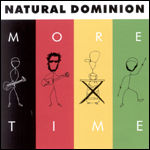 Natural
Dominion: More Time
Natural
Dominion: More Time
[ComeUnity Recordings, 2003]
Its an interesting voice that
emanates from Philip Hendricks, Natural Dominions lead singer (and guitarist
and percussionist and song writer). It has an unusual characternot a
pretty voice, but certainly an arresting one. Perhaps it was never meant
to be a singing voice, given its lack of range: rough on the high notes,
straining for the low ones. But considering Hendricks courageous, creative
delivery, I wouldnt give up on him. Hes ripe for vocal training, thats
all, and once his rawness gets refined hell be a powerhouse singer. In
the meantime, be thankful for the female background vocals, ubiquitous
and highly supportive, but never overpowering (even if at times you wish
they were).
The songs on More Time
are interesting too. Familiar themes, but lyrics slightly off-kilter;
consider this, for example: I use to feel like a moat,/As wide as the
ocean,/Lay between me and my castle./Until I saw the light/Of your shining
face./It made me search within./Oh Lord, I had to find my place./And so
I said my prayers,/And I jumped right into the race./And then the spirits
whispered,/Dont let the off key notes,/Dont let them interrupt,/Interrupt
your love song, no. From wide moat to non-interrupted love song in 12
uneasy stepsno coherent vision, no thinking it through, just one wild
leap after another. Is that lazy or pretentious or what? Listen here,
Mr. Hendricks, if you want to make a positive impression, you should be
willing to work at deserving it.
Next item of interest: the inspired
arrangements and strong musicianship on the instruments. From the very
start of the first trackemphatic drums and chords with voice-over asking
for Jahs guidancethe music is powerful reggae. Urgently serene one-drop
rhythms; frequently tuneful melodies. Enough hooks to keep you coming
back. Crabs Inna Bucket has dub effects; Revolutionary Spirit has
gentle guitar strumming and a reflective vocal; WAR has brief toasts
and a forceful ending. In fact, each of the nine tracks has something
unique and worthwhile going on.
Yes, More Time has lots
to like for roots reggae fans, but not everything. Got one of those shops
where you can listen first? Perfect. Try it out before you buy. No rush.
Take More Time if you want it.
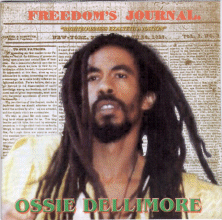 Ossie
Ossie
Dellimore: Freedoms Journal
[Skank Records, 2004]
The music on this disk isnt
old, but Freedoms Journal is a reissue anyway, slightly tweaked
with added dubs and a single. The reasoning was that it didnt get the
proper attention first time around, just a couple of years ago. That logic
seems entirely rational: this album is a powerful musical force that many
of us didnt latch onto at the time. But then, to get the exposure it
really deserves, it would probably have to be featured on the front page
of the New York Times. Thats not a likely event, given that
this is hard-core roots reggae. Not a likely event, given that its music.
Not likely, given that its not war, not economics, not politics and not
scandal.
But back to the album. The track
listing may make you think these are cover songs or close copies thereof:
The System, Fire Man, Rocker Reggae, Got to be Free, Downpressor
Man, for example. But these songs, and the rest, are neither covers nor
imitations; they are original lyrical explorations of admittedly familiar
themes using original and memorable melodies (and yes, they reflect a
familiarity with what has gone before, but thats hardly a weakness).
These songs are delivered with the same unyielding commitment and vibrant
musicality that transform a select few reggae albums into classics of
the genre. Thats the level were dealing with here.
Whats so great about Freedoms
Journal, you ask? Many things. Fifty-five minutes worth of things.
First, the songs; fully realized, tuneful gems. Next, the instrumentalists:
skilled performers who are aggressive and gutsy when appropriate, sensitive
and subtle also when appropriate, and none of them synthesizing anything.
Third, the frequent and extended interplay between Dellimores very masculine,
edgy lead and the smoother, beautifully contrasting, highly responsive
backing voices of Starlett Kirby, Rahsheba Lewis and Adama Kefentse.
Its normal to arrange tunes with that kind of vocal interplay, but seldom
have I heard the device used as effectively. Fourth, the creative, bold
musical arrangements, including a subdued organ solo used as a bridge,
nicely-varied tempos, bright horn charts, a Junior Demus toast (in a U-Roy
mode) on Sharp as a Razor, and most daringly, the occasional naked voice
of Dellimore , stark and urgent. Fifth, the clever, thoughtful and occasionally
playful lyrics, in which sound is as important as sense, each lyric perfectly
aligned with its tune. Sixth, the two dubs and one extended mix: opportunities
for fuller appreciation.
This album may have a couple of
minor downsides for some people. Some may not like Dellimores vocal mannerisms,
including his penchant for turning up instead of down at the end of a
musical phrase. For me that merely sustains emphasis where it would normally
be lost. The timbre of his voice may not appeal to some, but in fact its
highly expressive. Aside from those points (and even those are stretching
it) I cant think of anything that one could justifiably criticize in
Freedoms Journal . It is an inspired work of art.
 Cosmo:
Get Up and Jump
Cosmo:
Get Up and Jump
[Ginger Girl Records, 2003]
The liner notes for Get Up and
Jump reveal Cosmo as Dr. Cosmo Fraser. The title is reala true
oddity amidst such honorary reggae titles as Prince, Jah and Ras.
Cosmo is a practicing physician with the desire and money, and somehow
the time, to get this album out. Music is not his day job, so it would
be easy enough to label Get Up and Jump as self-indulgent. Which
it is, but so is most of what people do, such as my reviews. Self-indulgence
is fun.
But is it art? Well, Im not sure.
Cosmos singing voice is not beautiful or supple or commanding, but he
seems to accept its limitations, content to come across as gentle and
sincere instead of dramatic and audacious. And refreshingly, his vocal
style doesnt copy that of other reggae artists; he is every bit as influenced
by vocalists in other genres. His songwriting tends toward the simplistic:
pleasant, basic, lightweight tunes that are highly reminiscent of something
youve heard before, making the two and a half cover versions the album
highlights. The musicianship, however, is top notch. Thats why you cant
dismiss this disk with a flippant shrug.
A word about that musicianship:
Cosmo has obviously recruited a pretty talented band anyway, but when
he added such legendary folks for this outing as Horsemouth Wallace
on drums, Fully Fullwood on bass and piano, and guitarists Tony Chin
and Hux Brown, well, he was working with some of the best. Part of the
self-indulgence, I suppose, but why not?
In contrast to the cover art, which
shows a plodding Cosmo casting a long, ominous shadow, the sprightly title
song sets an appropriate mood for what follows: he wakes up in the morning,
hears himself on the radio, and wants to get up and jump. Thus the bounciness
of the second and various other tracks. Several tunes have a welcome country
& western feel; I figure Cosmo is the only person in the world who
still keeps his Kenny Rogers records near his turntable. But Im sad to
report that the nyahbingi track is a failure, its lyrics being ridiculously
repetitive. About the two and a half covers: Jimmy Cliffs beautiful Sitting
in Limbo is one; the Gladiators Hello Carol, with the added touch
of a female vocal, is the second, and Heard You Watching Me is the half
(hint: Every move you make/Every breath you take/Every smile you break,
girl/Heard you watching me).
Im not going to make any cracks
about Dr. Cosmo not quitting his day job. Its likely a stressful one,
and who among us wouldnt like to be a reggae professional if we had the
talent? Its just that he hasnt quite come into his own yet, either as
a tunesmith, lyricist, or vocalist. Hes come close with this enjoyable
album, but any real power it has is in the production, arrangements and
instrumental proficiency. Reggae with only partial power you can do without.
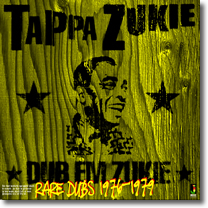 Tappa
Zukie: Dub Em Zukie: Rare Dubs 1976-1979 [Jamaican Recordings, 2003]
Tappa
Zukie: Dub Em Zukie: Rare Dubs 1976-1979 [Jamaican Recordings, 2003]
This may be brief. Not because
this disk doesn’t deserve a detailed description plus intensive
investigation plus sympathetic synopsis. No, only because it’s darned
difficult to describe dub, despite my duty, desire and determination to
do so.
Let’s get started. Tappa
Zukie’s approach on the late ’70s dubs presented here is much
the same as it was for his first dub album, Tapper Zukie In Dub (no surprise,
given that one’s 1976 release date). He likes to introduce the subject
matter for each dub very early by presenting—relatively unscathed—a
bar or two of the original song, including vocal. Or if not the actual
original, at least his own or someone else’s cover version of it.
In any case, a smidgeon of voice and melody often surfaces near the beginning.
After that teaser, though, the vocal is usually subsumed entirely as the
Zukie creativity rapidly takes over and he starts playing around with
the mix, the texture, any element of the sound available to him in the
studio—over an intact, solid rhythm, of course.
I like the Tappa touch, although
as always in dub, the enjoyment is partly due to the original songs and
the strength of their rhythms (as well as partly dependent on turning
up the volume). Delroy Wilson’s “Never Will Conquer Me”
comes up first for the treatment, followed by Johnny Clarke’s cover
of “Ballistic Affair”. Larry Marshall’s “Throw
Me Corn” is here too, in altered state. Sometimes the genesis of
the track becomes tricky to explain, witness what the liner notes say
about “Give Me Dub”: “Johnny Clarke’s version
to Slim Smith’s ‘Give me a Love’ supplied the musical
bones to make Tappa’s ‘Chalice to Chalice’ cut, of which
this is a lost dub to.” Twisted syntax aside, it’s still a
riddle inside a mystery wrapped in an enigma, a condition that in dub
is usually reserved for the music itself.
Two of Zukie’s treatments
here don’t work well. “Conversation Dub” is one; the
rhythmic base is so simplistic that once every other element is subdued,
the track quickly becomes boring and doesn’t communicate a thing,
despite its title. Similarly, in “Rock You Rock Dub” a repeated
short phrase plods along endlessly without sufficient interesting context
to support it. Nevertheless, most other tracks do what they are expected
to do, and some work beautifully. I like the build-up of tension in “Dub
Next Door”, where the dub effects enrich the tune to an even greater
degree than usual. And thanks to Burning Spear’s composing genius,
“Bagga Wire Dub” is another highlight.
I’ve gone on longer than
I expected, but it’s time to end. Dub Em Zukie is mostly very enjoyable.
At low volume, good to read by. Otherwise, good to dance or cook or exercise
to. And at high volume, for the majority of the album, good for nothing
less than total immersion.
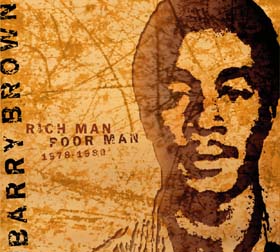 Barry
Brown: Rich Man Poor Man 1978-1980
Barry
Brown: Rich Man Poor Man 1978-1980
[Moll-Selekta, 2003]
Nineteen years ago in a small shop
in small town Canada, I came across an album that was obviously reggae
(red, green and gold border), by someone named Barry Brown. I had never
heard of the guy. The LP was entitled Superstar, but there was no such
song on the album. Apparently the title referred to Brown himself. Not
Singer, not Star, not Hotshot Flavour of the Month in the Jamaican
Dancehall, but Superstar. So I was flummoxed. A superstar Id never
heard of. It happens all the time in pop culture and sports, and I just
yawn. But in reggae? What gives? The price was right, so I handed over
my money. Turned out to be competent, generic roots reggae that mostly
stayed on my shelf.
In the two decades since, Ive
come across Barry Browns music occasionally on various artist compilations,
and it was okay. Really, it was fine. Some of the songs were big hits,
apparently. I just never bought another Barry Brown album. And now this
collection issues forth. The artist at the peak of his powers, with
some of his best songs, according to the liner notes. That puts us into
matter-of-opinion territory, and I think those claims are wrong.
What we have here is competent,
generic roots reggae from early in Browns career, prior to his notable
duets with some of reggaes better dancehall DJs. Theres not a lot of
variation in his solo vocal approacheasily identifiable for his rather
pinched delivery and refusal to enunciate final consonants. Nor is there
much distinctiveness in his songwriting here. The usual excellent studio
musicians of the time, including Roots Radics, The Revolutionaries and
The Aggrovators, provide sturdy backing, and at times those fellows really
cookthe further you get into the second track, for example, the less
attention you give to Brown and the more you give to the accompaniment.
Track three turns out to be the Studio One Love Me Forever riddim, over
which Brown asks Jah for guidance and protection. His social-critique
side (someone once compared him to Bob Dylan) comes out in track five,
and you can understand why he didnt incite many revolutions: if you
dont have money in your pocket you feel down and out .I dont feel right
when I dont got money in my pocket. His slow, deliberate cover of the
Livingston/Tosh tune Burial is a dubbish highlight; another is the title
track, which is more dynamicand therefore memorablethan most of its
neighbors. A dub of that tune closes the album.
Thats about it. Some love lyrics,
some dread lyrics. Solid, unexciting roots reggae. If you dont have Barry
Brown already, or have only his later stuff, this album will nicely fill
the gap. But it wasnt a very big gap.
——————
Although the closest Ted Boothroyd has come to a personal
association with the Caribbean was to have a Trinidadian grandfather, which
Ted
didn’t really have a lot to do with, he happily took in Harry Belafonte’s
calypso
hits in the ’50s and became a huge reggae fan in 1969 when Desmond
Dekker’s “Israelites” hit big in Canada. Ted has reviewed books
on Caribbean music for The Beat, writes album reviews for other periodicals,
and co-hosts
a reggae and world music radio show in Fredericton, New Brunswick,
on Canada’s east coast.






